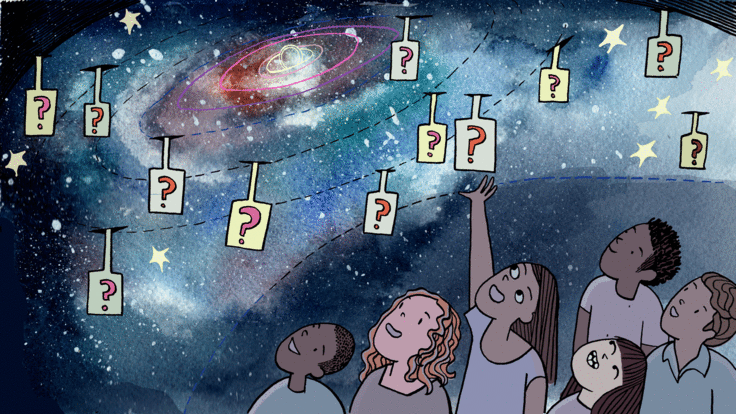Michael Wilson, 29, could be considered a member of the Millennial generation. He’s been expressing himself online since he was a teenager posting videos on inline skating forums.
So when he got interested in string theory, he had a very Millennial response: He decided to make a music video about it for his YouTube channel.
Wilson first heard about string theory—the idea that everything in the universe is made up of small, vibrating strings—when physicist S. James Gates Jr. gave a public SciCafé lecture at the American Museum of Natural History. He was intrigued, but he knew he needed to learn more. He wanted his song to be more than catchy; he wanted it to be educational.
“You can listen to someone give a definition of something, and you can repeat that without knowing what you’re saying,” he said. “You need to truly master information before you can tell other people about it.”
It’s a skill Wilson has been practicing for eight years as a member of a team of guides, called “explainers,” at the New York Hall of Science.
Wilson went straight to social media to research. He watched programs with science popularizers such as Michio Kaku and studied physics music videos on YouTube. He came up with a hook: “By studying the world around us, we can learn our history. What happened before time? Before Big Bang Theory? The answers to the universe remain a mystery. But vibrating strings may unravel reality.”
Using his own time, a green screen he bought on eBay and the editing skills he’d picked up creating World of Warcraft videos, he created “String Theory Song.” In the video, he plays the bass to demonstrate how a string vibrating at different frequencies produces different notes, just as microscopic strings might vibrate at different frequencies to create different subatomic particles. The video has gotten more than 13,000 views so far.
Wilson admits he’s not the best musician, or even the best editor. “I just play around,” he said. “It takes me forever.”
But that hasn’t stopped him. A Facebook suggestion led him to the theme for his next physics video, a rap about dark matter.
Posting his videos online has given Wilson his own review panel, viewers who let him know when he’s made a mistake. He’s already made one correction. But even before a new video goes live, the thought that thousands of people who might watch it has made Wilson more careful with his fact-checking.
“In the dark matter video, I almost made all the planets revolve clockwise,” he said. “That was close.”
If Wilson can use crowd-sourcing to hone his rollerblading skills, he might as well use it to refine his physics knowledge, too.







